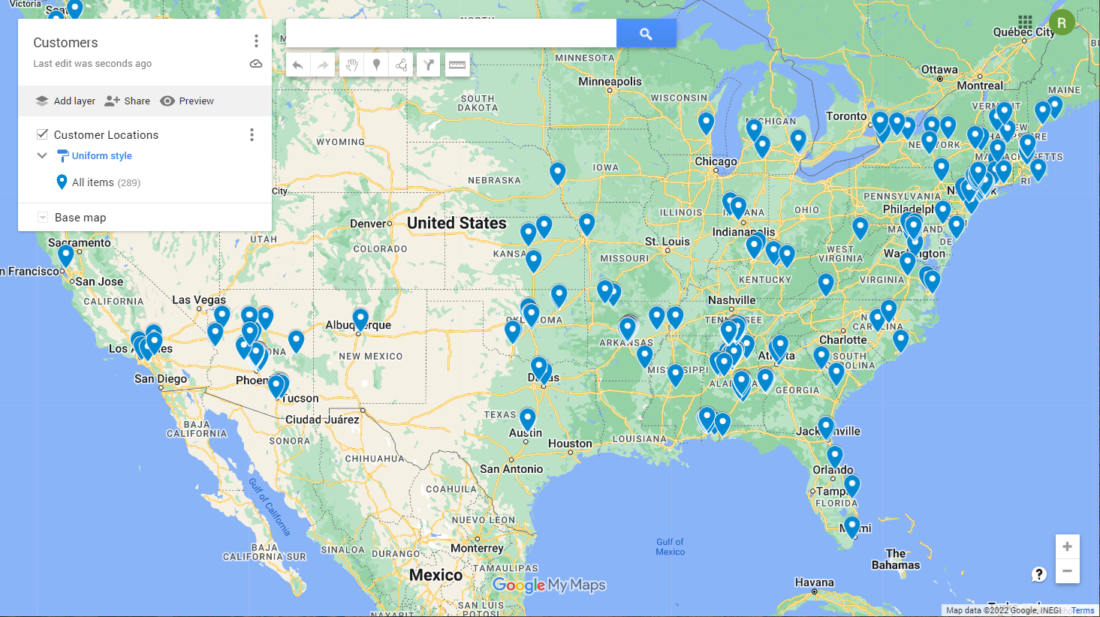Where To Start A Business: A Map Of The Country's Top Locations

Table of Contents
Top States for Business Growth
The overall economic climate, business-friendly policies, and growth projections of a state significantly influence a business's success. Let's examine some top contenders:
Texas – The Lone Star State's Business Appeal
Texas boasts a compelling combination of low taxes, minimal regulations, and robust sectors like energy and technology. This makes it an attractive location for startups and established businesses alike.
- Access to a large consumer market: Texas has a massive population providing a substantial customer base for diverse businesses.
- Strong infrastructure: Excellent transportation networks, including highways, airports, and seaports, facilitate efficient logistics.
- Thriving entrepreneurial ecosystem: A supportive network of incubators, accelerators, and venture capitalists fosters innovation and growth.
California – The Golden State's Opportunities & Challenges
California, while known for its high cost of living and operating, remains a powerhouse of innovation and a massive market. The opportunities are immense, but so is the competition.
- Access to venture capital: Silicon Valley and other tech hubs provide unparalleled access to funding for startups.
- Leading technology industries: California is a global center for technology, offering a rich talent pool and networking opportunities.
- A diverse talent pool: A vast and diverse workforce provides access to specialized skills, but attracting and retaining top talent requires competitive compensation packages.
Florida – Sunshine State Business Advantages
Florida offers a blend of attractive features for businesses: a warm climate, a growing population, and a lower cost of living than many other states.
- No state income tax: A significant advantage for businesses and individuals alike.
- Tourism-driven economy: Provides a solid foundation for businesses related to hospitality, entertainment, and recreation.
- Growing tech sector: Florida's tech scene is expanding, presenting opportunities in various fields.
New York – The Empire State's Financial Prowess
New York, despite its high costs, remains a major business hub, particularly in finance and media.
- Global financial center: Access to capital and a large pool of financial professionals.
- Strong legal and professional services: Supports a wide range of businesses.
- Major transportation hub: Facilitates ease of movement for goods and people.
City vs. Rural: Weighing the Pros and Cons
The decision between an urban or rural location significantly impacts business operations and growth potential.
Urban Advantages
- Larger talent pool: Cities offer access to a wider variety of skilled workers.
- More established infrastructure: Utilities, transportation, and communication networks are typically more robust.
- Higher consumer density: A larger potential customer base within a concentrated area.
- Networking opportunities: Greater access to industry events, conferences, and potential collaborators.
Rural Advantages
- Lower cost of living and operating: Rent, utilities, and other expenses are generally lower.
- Less competition: Reduced competition in certain industries, creating a niche market advantage.
- Access to specialized resources: Depending on the location, this could include agricultural land, natural resources, or unique manufacturing capabilities.
- Strong sense of community: Stronger community support can be beneficial for local businesses.
Key Factors to Consider When Choosing a Location
Beyond state and urban/rural choices, several other crucial factors influence business location decisions:
Market Analysis: Understanding Your Target Audience
Conduct thorough market research to determine where your target customers are located and their specific needs.
Infrastructure: Essential Business Support
Assess access to reliable transportation (roads, railways, airports), utilities (electricity, water, gas), and communication networks (internet, phone).
Tax Implications: Minimizing Costs
Analyze state and local taxes, available incentives, and potential cost savings to optimize your financial strategy.
Labor Market: Finding the Right People
Investigate the availability of skilled workers, prevailing wage rates, and the overall competitiveness of the local labor market.
Regulatory Environment: Navigating Permits and Licenses
Understand the specific business licenses, permits, and compliance requirements for your industry in the chosen location.
Cost of Living: Attracting and Retaining Talent
Consider the cost of living impact on attracting and retaining employees, especially in competitive industries.
Quality of Life: A Magnet for Top Talent
A high quality of life, including community amenities, educational opportunities, and recreational activities, can be a significant factor in attracting and retaining top talent.
Utilizing Resources to Find the Perfect Spot
Numerous resources can assist your location research:
- U.S. Census Bureau: Provides demographic and economic data at various geographic levels. [Link to Census Bureau website]
- Small Business Administration (SBA): Offers resources and guidance for small business owners. [Link to SBA website]
- State and Local Economic Development Agencies: Provide information on business incentives, available land, and workforce statistics. [Link to example state economic development agency]
- Market Research Firms: Offer in-depth market analysis and competitive intelligence.
Conclusion
Choosing the right location to start a business is a critical decision impacting your success. By carefully analyzing state economic climates, urban versus rural environments, and your target market, you increase your chances of finding the perfect location. Remember to thoroughly research the market, understand the regulatory landscape, and consider the overall cost of living and quality of life. Start your journey to finding the ideal spot to launch your business today! Use our insights to find the best place to start a business and watch your enterprise flourish. Don't delay – start planning your business location strategy now!

Featured Posts
-
 Databricks Accelerates Ai Growth With Hundreds Of New India Based Roles
Apr 25, 2025
Databricks Accelerates Ai Growth With Hundreds Of New India Based Roles
Apr 25, 2025 -
 2025s Rpg Phenomenon Uncovering The All Star Lineup
Apr 25, 2025
2025s Rpg Phenomenon Uncovering The All Star Lineup
Apr 25, 2025 -
 A Strategic Partnership Analyzing Chinas Proposal For Collaboration With Canada
Apr 25, 2025
A Strategic Partnership Analyzing Chinas Proposal For Collaboration With Canada
Apr 25, 2025 -
 Manalapan Florida A Booming Real Estate Market Driven By The Ultra Wealthy
Apr 25, 2025
Manalapan Florida A Booming Real Estate Market Driven By The Ultra Wealthy
Apr 25, 2025 -
 Newsoms Toxic Remark Ignites Democratic Party Debate
Apr 25, 2025
Newsoms Toxic Remark Ignites Democratic Party Debate
Apr 25, 2025
Latest Posts
-
 German Conservatives And Social Democrats Begin Coalition Talks
Apr 30, 2025
German Conservatives And Social Democrats Begin Coalition Talks
Apr 30, 2025 -
 Is Asparagus Good For You Exploring The Health Advantages Of Asparagus
Apr 30, 2025
Is Asparagus Good For You Exploring The Health Advantages Of Asparagus
Apr 30, 2025 -
 How Healthy Is Asparagus Nutritional Benefits And Health Effects
Apr 30, 2025
How Healthy Is Asparagus Nutritional Benefits And Health Effects
Apr 30, 2025 -
 The Complete Guide To Asparagus And Its Health Benefits
Apr 30, 2025
The Complete Guide To Asparagus And Its Health Benefits
Apr 30, 2025 -
 Asparagus And Health Exploring The Positive Impacts
Apr 30, 2025
Asparagus And Health Exploring The Positive Impacts
Apr 30, 2025
